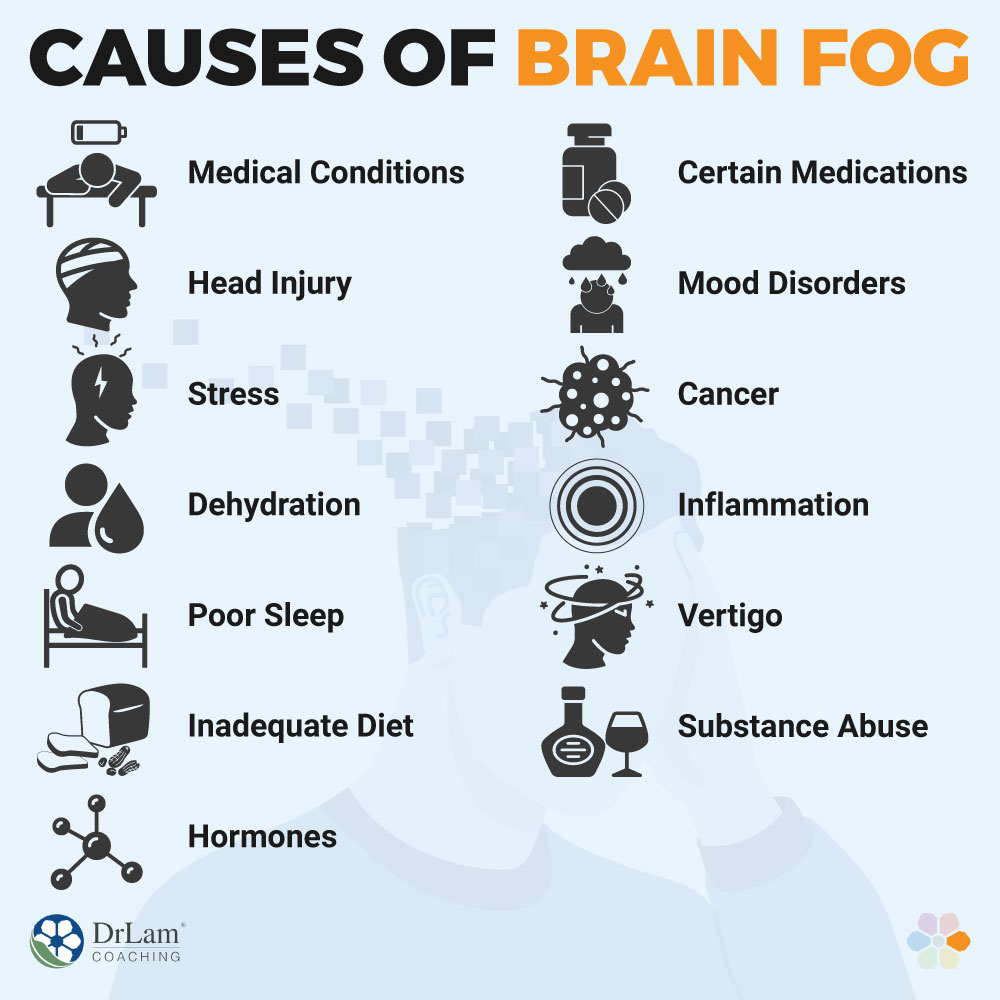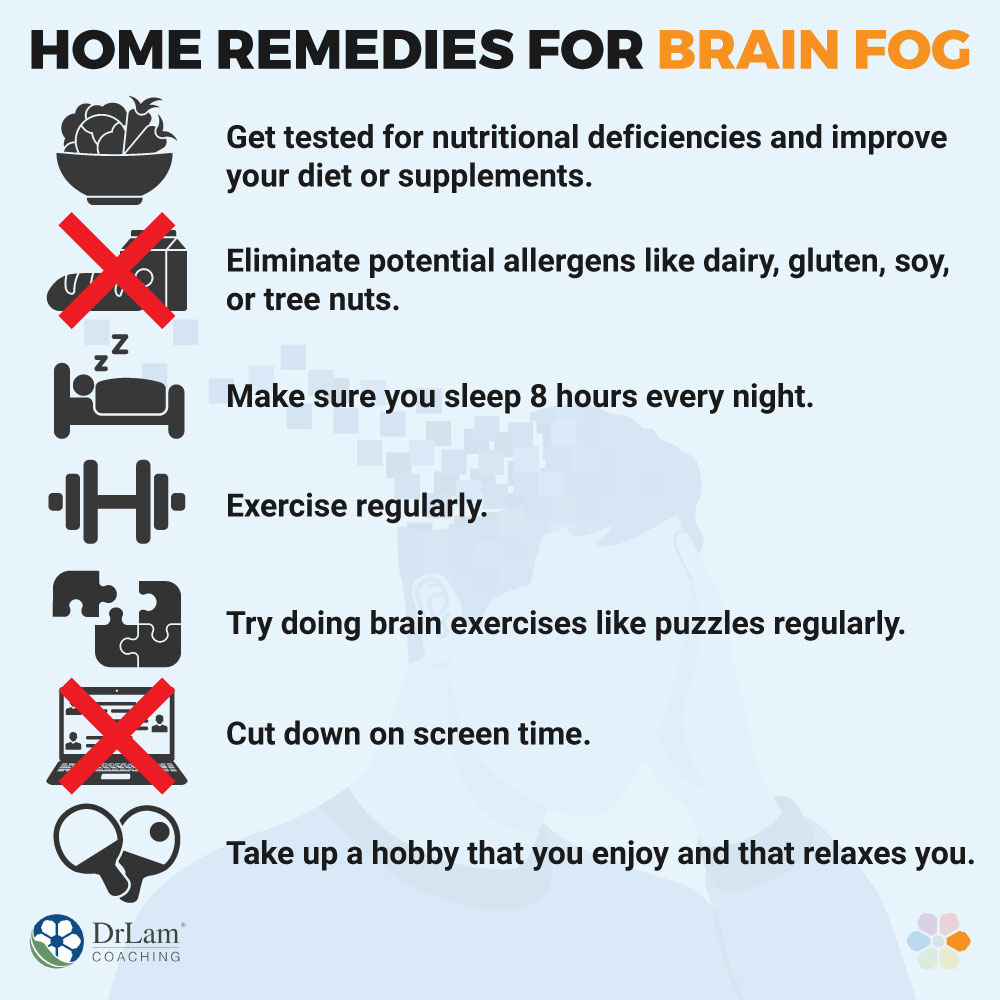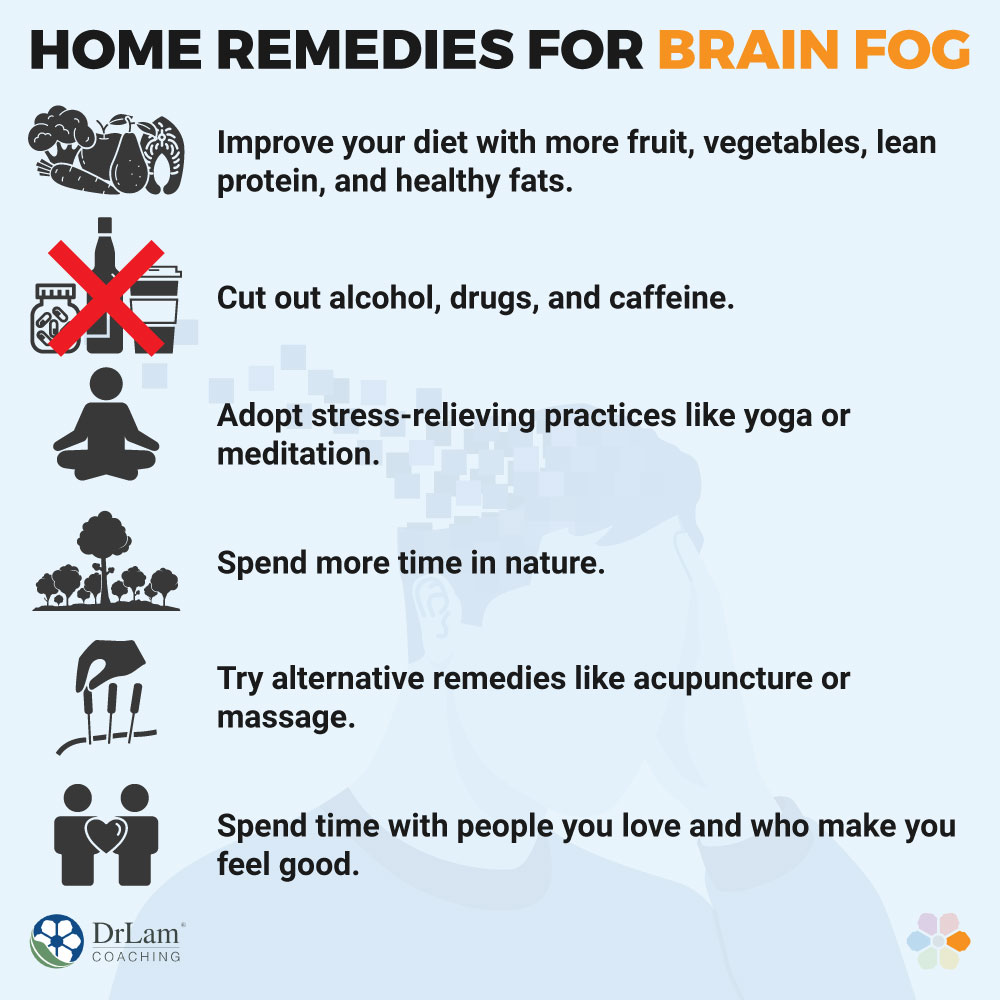
Do you sometimes feel as if your brain just isn’t functioning properly? As if you just can't seem to focus or recall the right thought? This sensation is fairly common, and it’s known as brain fog. It is often harmless and natural, something that goes away with a little more sleep or a good rest. But if it occurs regularly, it can start to affect your home life, work, relationships, and be a sign of deeper problems. There are several possible causes for the cluster of symptoms we call brain fog, and there are also steps you can take to try to get your clarity back.
» Read our complete long-read article on brain fog
» Adrenal Fatigue FAQs
» Take our 3-minute test to see if you may have Adrenal Fatigue
 Brain fog is a rather vague symptom that causes issues like:
Brain fog is a rather vague symptom that causes issues like:
On its own, this fuzzy feeling isn’t a sign of any specific condition, but when combined with other symptoms it can indicate certain health problems. That’s why, if you experience a foggy brain often over a long period, you should visit your doctor for a checkup.
Brain fog can also have other mental and physical symptoms including:

Many different factors can cause brain fog. If you experience this symptom, then it’s important to identify the causes that apply to you so you can address them. Some common causes include:
There are several medical conditions that can cause a foggy brain, usually because of inflammation, changes in blood glucose levels, or mental or physical fatigue. Some of these conditions are:
It’s important that you see your doctor if you experience this symptom to rule out these conditions.
If you have or have had a head injury, then you may experience a foggy brain. It’s important that you visit your doctor immediately if you experience this symptom after a head injury to rule out potentially dangerous issues.
Stress, particularly chronic stress, is a very common cause of brain fog. It causes inflammation, weakens the immune system, triggers mood disorders, and has a number of other effects that can bring on this symptom.
Your body needs a lot of water to function correctly, and if you aren’t getting enough then you will definitely find yourself with a foggy brain.
 Your body and your brain need around 8 hours of sleep every night. If you don’t get the sleep you need, your brain can’t function correctly, leading to a foggy brain.
Your body and your brain need around 8 hours of sleep every night. If you don’t get the sleep you need, your brain can’t function correctly, leading to a foggy brain.
Sleep apnea in particular is associated with a foggy brain. This condition causes you to stop breathing while you sleep, waking you when the brain starts to be starved of oxygen. Often people with sleep apnea get poor sleep but don't realize it. The damage and stress caused by this can cause your brain to be foggy even when you’re awake.
Vitamin deficiencies are a common cause of a foggy brain, particularly vitamin B-12 deficiencies because this vitamin helps support healthy brain function.
Food sensitivities or allergies can also cause this problem. So, try cutting out the following foods and see if it makes a difference:
Your hormones exist in a careful balance, and when this balance is lost, it can bring on brain fog. This applies particularly to women. When the balance between estrogen and progesterone changes because of pregnancy or menopause, it can affect your memory and cognition.
Medications can be stronger than you think and many of them cause brain fog as a side effect. If you experience this symptom and believe it’s due to a medication that you’re taking, talk to your doctor about alternatives.
Mood disorders like anxiety and depression can take all your energy, leaving your brain feeling foggy and decreasing your ability to concentrate. These conditions are often associated with other symptoms such as low energy, poor sleep, appetite changes, lack of interest in daily activities, and feelings of hopelessness and worthlessness. Make sure that you see your doctor for help with these conditions as soon as possible.
Brain fog is strongly associated with cancer and the therapies used to kill the cancerous cells. People undergoing radiation or chemotherapy often experience a foggy brain that continues even after the therapies are finished.
Almost all of these causes will increase the inflammation levels in your body and perhaps lead to chronic inflammation, itself a common cause of brain fog. You may also have inflammation because of other factors, like infections or general poor health, which can increase your chances of experiencing a foggy brain as a result.
You may experience vertigo when the acoustic or balance nerves in your ears are damaged. The dizziness that occurs after this type of injury will naturally bring on feelings of a foggy brain and difficulty concentrating.
Drinking too much or taking drugs can also lead to this symptom. These substances interfere with the natural function of the brain and its cells, causing dizziness and difficulty concentrating, as well as other issues associated with a foggy brain.
If you experience brain fog over a prolonged period or if it worsens, then you need to see your doctor. They can help identify other health conditions that may be causing your symptoms.
Unfortunately, a single test usually won’t identify the cause of this problem. Instead, your doctor will most likely:
If all of this comes back clear but your symptoms persist or worsen, then further tests can be performed such as:

 Once your doctor has ruled out any conditions that might be causing your brain fog, there are other steps you can take to get your life back. Brain fog can decrease your quality of life markedly, so you need to take steps yourself to find relief.
Once your doctor has ruled out any conditions that might be causing your brain fog, there are other steps you can take to get your life back. Brain fog can decrease your quality of life markedly, so you need to take steps yourself to find relief.
Some lifestyle that may improve your symptoms. Try one at a time and monitor your symptoms for changes. Some steps to try include:

Brain fog is an extremely common symptom for people who experience chronic stress and the stress-related condition, Adrenal Fatigue Syndrome (AFS). AFS occurs when the adrenal glands become fatigued due to ongoing demand for cortisol, the stress hormone.
The adrenals are part of the NeuroEndoMetabolic (NEM) stress response, the global system of organs and systems that helps protect your body from external and internal damage as a result of stress. This is a natural process but when you’re chronically stressed, it becomes overused. The changes the NEM stress response makes in your body continue for too long and start to cause malfunctions and imbalances.
In AFS, these issues are usually seen first in the adrenal glands, which produce the cortisol that drives the NEM stress response. As AFS progresses, the body demands more and more cortisol to cope with the ongoing stress. The adrenal glands get fatigued from the high cortisol demand and can cause other hormone imbalances. This can lead to a whole range of symptoms and problems in your body.
A foggy brain and memory and concentration problems can occur very early in AFS. This is usually due to imbalances in the various circuits, including the Neuroaffect Circuit and, most significantly, the Detoxification Circuit.
The Detoxification Circuit is made up of the immune system, the liver, and the extracellular matrix (ECM). These three components work together to rid the body of reactive metabolites. These are natural compounds that are created when your body breaks down food, chemicals, or its own tissue. When you’re healthy, your Detoxification Circuit renders these metabolites inert and harmless and expels them from the body without your awareness. But when you have detoxification problems, these metabolites start to build up in your body.
As metabolites build up, the liver starts to struggle to keep up with its tasks of deactivating and expelling the metabolites. It becomes clogged with metabolites, which can be released back into the body still active. In this state, they can damage the body.
This damage and the toxic build-up causes the activation of the immune system, which produces inflammation to try and rid your body of the invaders. This causes the creation of even more metabolites, which compounds the problem and can lead to chronic inflammation, as the immune system attacks invaders it can't expel.
The metabolite build-up also causes congestion in the ECM, where chemical messages are passed between cells.
All this can lead to toxins that your body can't flush out making their way into the brain, where they cause further inflammation, impede cell communication, and create brain fog.
Brain fog might seem like nothing to worry about, and it’s true that it's not usually a sign that something serious is wrong. But if it lingers over time, it can be an indication of certain conditions. It can also seriously impact every aspect of your life.
If you’re tired of feeling as if you’re in a fog all the time, here’s what to do:
For more help with brain fog or other symptoms of adrenal fatigue, talk to our team at +1 (626) 571-1234 or click here.
Brain fog is a common and often ignored symptom that causes general brain fogginess, lack of concentration, memory issues, and problems with cognition. On its own, it’s not usually a symptom of a specific condition but it can severely impact your quality of life.
"There is a large amount of information"
"There is a large amount of information, and I feel overwhelmed by it all. I have set a bookmark on your web site and over the next few weeks will try to read and absorb this information. Thank you!"